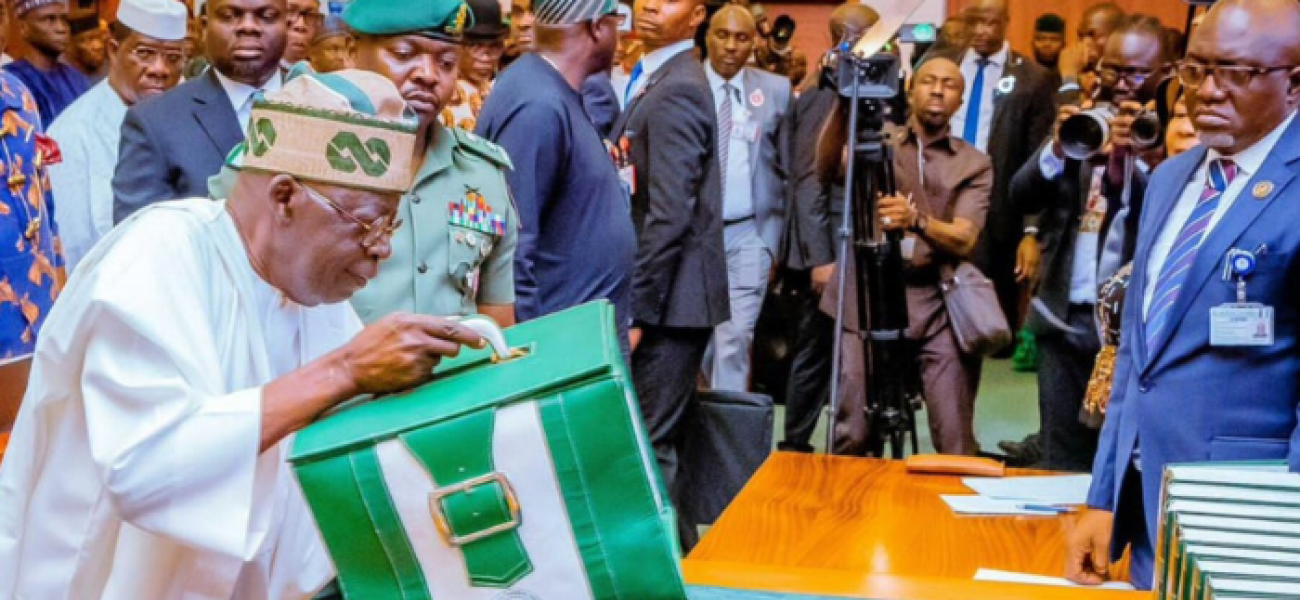President Bola Tinubu on Wednesday, November 28, presented the 2024 Appropriation Bill to a Joint Session of the National Assembly. This will be President Tinubu’s first substantive Appropriation Bill since assuming office on May 29, 2023. It will be recalled that he had submitted the 2023 Supplementary Budget to the National Assembly in October 2023.
In his welcome address at the 2024 Budget presentation, President of the Senate, Senator Godswill Akpabio expressed the National Assembly’s commitment to “conduct a thorough and meticulous review of the budget estimates.” He noted that both chambers of the National Assembly agree on the need to “encourage the Executive Arm to unbundle some agencies for effectiveness, and merge agencies of Government which job definitions or or roles overlap, for greater effectiveness”. He also expressed continued support for the war against corruption and collaboration with anti-graft agencies to ensure a stop to loss of public funds that should otherwise be used for development. He further requested that President Tinubu should mandate Ministers and Heads of Agencies to avoid any travelling engagements that would prevent them from honoring invitations to appear before the National Assembly Committees to defend their budget estimates.
In his speech, Speaker of the House of Representatives, Rt. Hon. Tajudeen Abbas noted that the National Assembly will ensure that the 2024 budget includes concrete strategies for sustainable debt management, including measures to increase revenue and control expenditure. He further noted that the effectiveness and legitimacy of fiscal policies depend to a very large extent on public support. According to him, the House of Representatives in line with its Legislative Agenda, will convene the first national Citizens’ Budget Town Hall to harness public input and opinion. He added that the House will work to institutionalise pre-budget engagement with the Executive, to further improve and hasten the budget process. He further noted that well-known gaps in the various stages of the budget process underscore the need for budget reforms, including altering relevant sections of the Constitution and existing laws. He therefore proposed the passage of a ‘Budget Act’ to strengthen the budget process and promote development outcomes.
President Bola Tinubu in his presentation of the ‘2024 Budget of Renewed Hope,’ stated that the budget will help address structural problems in the economy by lowering the costs of doing business for companies and the cost of living for the average person. According to the President, the budget accords top priority to defence, internal security and human capital development.
The President noted that the Government has made provisions to leverage private capital for big-ticket infrastructure projects in energy, transportation and other sectors, emphasising public-private partnerships. He added that a more sustainable model of funding tertiary education will be implemented, including the Student Loan Scheme scheduled to become operational by January 2024.
He further noted that the Federal Government is reviewing social investment programmes to enhance their implementation and effectiveness. In particular, the National Social Safety Net project will be expanded to provide targeted cash transfers to poor and vulnerable households, and efforts made to graduate existing beneficiaries toward productive activities and employment.
The proposed 2024 National Budget of N27.5 trillion consisting of a projected revenue of N18.3 trillion and deficit of N9.18 trillion. He proposed expenditure is as follows:
- N8.73 trillion – Capital expenditure
- N9.92 trillion – Non-debt recurrent expenditure
- N8.25 trillion – Debt service
The budget is predicated on the parametres set out in the 2024-2026 Medium-Term Expenditure Framework and Fiscal Strategy Paper (MTEF-FSP), earlier approved by the National Assembly. The exchange rate is placed at N750 to $1, crude oil benchmark price at $77.96 per barrel with production estimate of 1.78 million barrels per day and the inflation rate put at 21.4%.
The 2023 budget deficit of N9.18 trillion or 3.88 percent of Gross Domestic Product (GDP) is lower than the N13.78 trillion deficit recorded in 2023, which represents 6.11 percent of GDP. The deficit will be financed by new borrowings totalling 7.83 trillion. The sum of N298.49 billion will come from Privatisation Proceeds while N1.05 trillion will come from drawdown on multilateral and bilateral loans secured for specific development projects.
A breakdown of the 2024 budget released by the Minster of Budget and Economic Planning, Abubakar Atiku Bagudu shows allocations to critical sectors, as follows:
Education – N2.18 trillion (7.9% of the budget)
- Federal Ministry of Education and its agencies (recurrent & capital expenditure) – N1.23 trillion
- Universal Basic Education Commission (UBEC) – N251.47 billion
- Transfers to Tertiary Education Trust Fund (TETFUND) for infrastructure projects in tertiary institutions – N700 billion
Health – 1.33 trillion (5% of the budget)
- Federal Ministry of Health and its agencies (recurrent & capital expenditure) – N1.07 trillion
- GAVI/Immunisation funds, including counterpart funding for donor supported programmes – N137.21 billion
- Transfer to Basic Healthcare Provision Fund (BHCPF) – N125.74 billion (being 1% of the Consolidated Revenue Fund)
Defence and Security – N3.25 trillion (12% of the budget)
- Military, Police, Intelligence & Paramilitary (recurrent & capital expenditure)
Infrastructure – N1.32 trillion (5% of the budget)
- Works & Housing, Power, Transport, Water Resources, Aviation
Social Development & Poverty Reduction Programmes – N534 billion (2% of the budget)
- Provision for social investments/poverty reduction programmes

